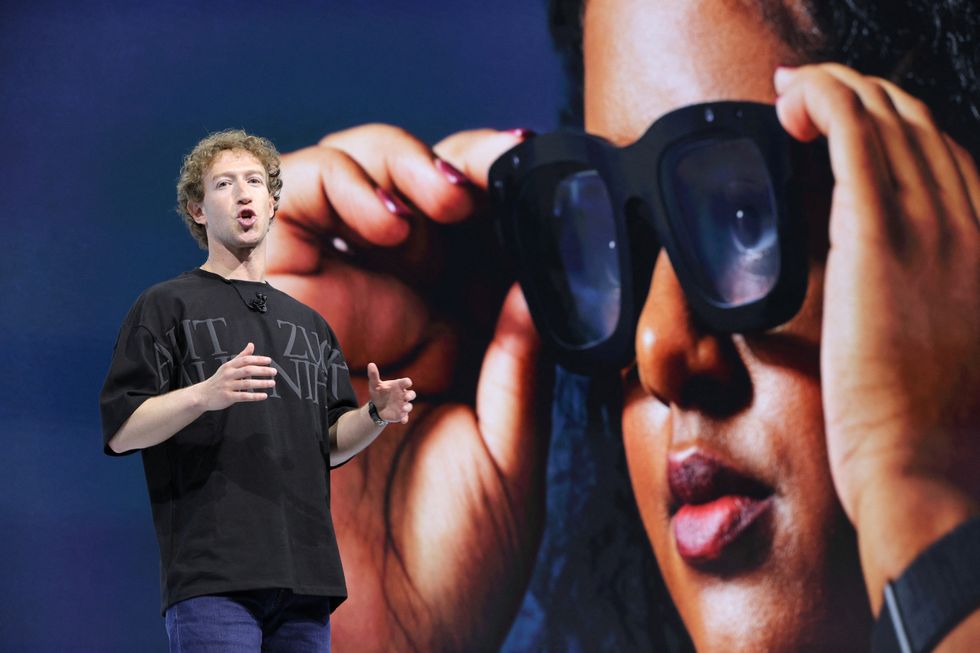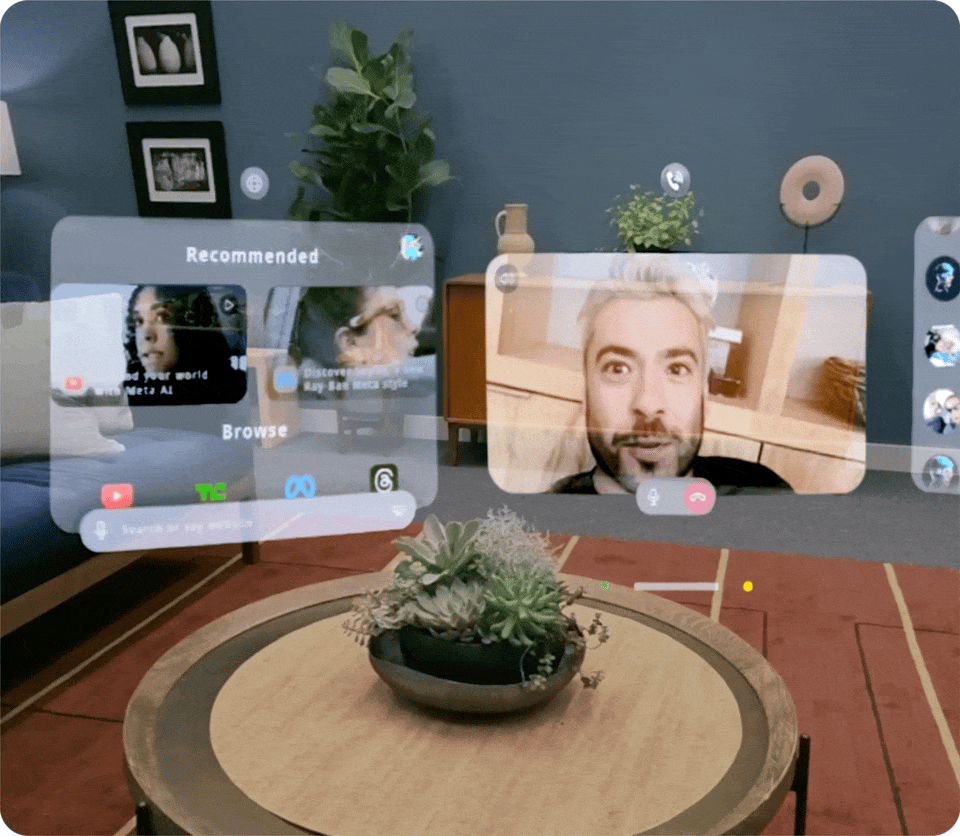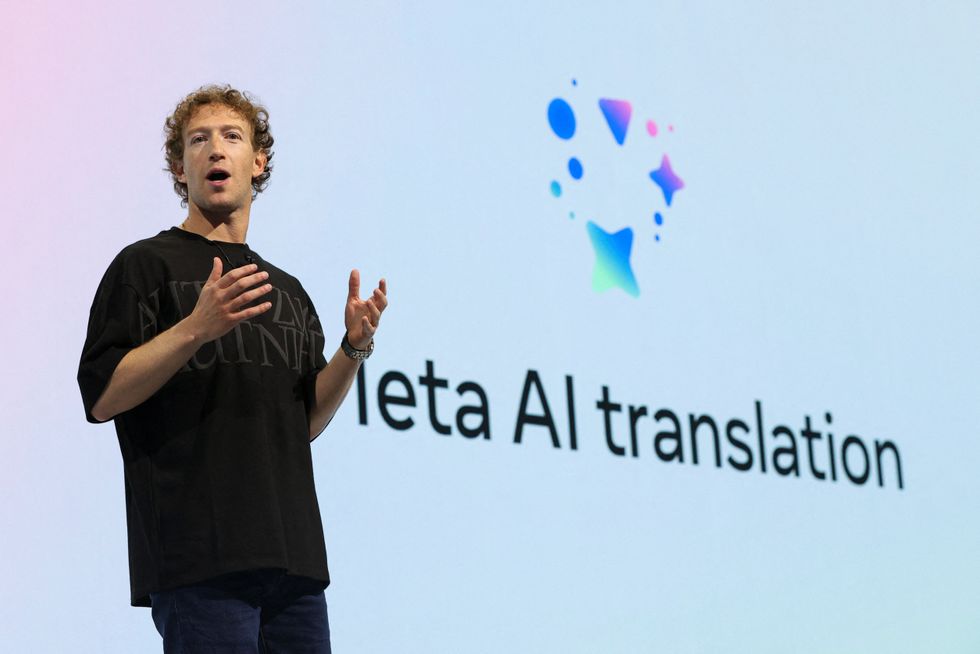Facebook CEO unveils smart glasses to replace your smartphone, but core feature is blocked in UK and EU

All products and promotions are independently selected by our experts. To help us provide free impartial advice, we will earn an affiliate commission if you buy something. Click here to learn more
Release date for Meta AI has stalled in the UK and Europe due to stricter privacy laws
- Meta CEO Mark Zuckerberg announced next-generation smart glasses
- Dubbed Orion, the prototype isn't available to buy anywhere yet
- It promises to overlay digital apps on everyday life
- You'll be able to check WhatsApp chats, directions, and calendar in the lenses
- Controlling the glasses will be handled with voice commands and gestures
- Meta AI has been improved, Zuckerberg announced
- Millions of Facebook, Instagram, and WhatsApp users rely on Meta AI
- However, the UK release of this system has stalled due to tough rules
- EU lawmakers have introduced tougher privacy laws than in the USA
- UK launch date wasn't confirmed, but will be behind Australia and Canada
Don't Miss
Most Read
Latest
Facebook parent company Meta has announced a pair of battery-powered glasses that use futuristic holograms to overlay digital content — like WhatsApp chats, a web browser and calculator — on your surroundings. Unlike rival gadgets, like the Apple Vision Pro, that uses advanced cameras and high-resolution screens to show a live feed of the world around you, the new Meta glasses enable you to still see the world around you.
Announced during the Meta Connect event, which enables the Californian company to showcase new advances to developers so that applications can be updated to take advantage of the new features, the prototype device called Orion “might be the most challenging consumer electronics device produced since the smartphone”.
Be one of the first to own the newly-announced Meta Quest 3S

With its UK release date set for October 15, the Meta Quest 3S is the latest Augmented Reality headset from Meta and comes equipped with the same flagship processor and wireless controllers as the £409 Meta Quest 3 headset. All Quest 3S headsets comes preloaded with Batman: Arkham Shadow game
Meta Quest 3S
$289.99

Meta CEO Mark Zuckerberg announced the new prototype during the keynote speech at the Meta Connect annual event at the company's headquarters in Menlo Park, California
|REUTERS

There's no release date for the Orion glasses yet, instead Meta will start testing the device with its own staff and “select, external audiences” so it can “learn, iterate, and build towards our consumer AR glasses product line, which we plan to begin shipping in the near future”
|REUTERS
According to Mark Zuckerberg, the 40-year-old co-creator of Facebook, the Orion specs were the result of “breakthrough inventions in virtually every field of modern computing” and come “packed with entirely new technologies” around display and computer chips in order to run the same experiences currently found in headsets on a pair of glasses not much bulkier than many standard frames.
These spectacles can be controlled using voice commands, eye movements, and hand gestures tracked by a small bracelet. Orion wearers can play virtual games — single and multiplayer with another person with the specs, reply to WhatsApp chats, follow recipes, and check calendar appointments without the need to pull your smartphone from your pocket.

Windowed applications float around your real-life surroundings as you peer through the glasses
|META PRESS OFFICE
But one of the core features of the Orion spectacles — the Artificial Intelligence (AI) developed by Meta to act as a helpful assistant — won't be coming to the UK or European Union anytime soon.
Meta says the decision to withhold its flagship AI helper is due to uncertainty around what data can be used to train AI models in Europe.

Meta AI will now be able to translate in real-time — helping with conversations between two people who don't speak the same language. For the first time, it can respond to voice commands
|REUTERS
For now, Meta AI products will only be rolled out in the United States, Canada, Australia, and New Zealand.
Meta says restrictive rules passed by European lawmakers have created uncertainty around what data can be used to train AI models. In an open letter mailed to European policymakers, Meta and 58 other consumer technology companies warned that fragmented regulation around AI puts mainland Europe at risk of "falling further behind in the AI era."
"Europe has become less competitive and less innovative compared to other regions," it adds.
Since the UK has formally left the European Union, it's widely expected that Meta AI will come to devices and apps before the rest of Europe. In preparation for the launch, Meta has already started to train its AI models using publicly shared posts, pictures, and comments from adults on Facebook and Instagram in the UK.
According to Meta, this process it critical to help its AI reflect British history and culture.
The Information Commissioner’s Office — a UK Government department established in the early 1980s — quizzed executives at Meta about these plans. In response, the company has simplified how social media users can object to the processing of their data within account settings. On contrast, EU regulators have dinged Mark Zuckerberg's company, stressting that current plans do not meet its tough privacy and transparency rules.
As well as being a core part of the incoming Orion glasses, Meta AI will can be found across its suite of social media and messaging apps, including Facebook, Instagram, and WhatsApp. The company said more than 400 million people are using Meta AI monthly, including 185 million who are returning to it weekly.
Later in the Meta Connect event, Mark Zuckerberg confirmed that Meta would be adding the ability to converse with its latest Artificial Intelligence models. New versions of Meta’s open-source AI models – Llama 3.2 – were also announced.
Industry expert Mike Proulx, vice president research director at analyst firm Forrester, said the announcement of Orion had the potential to be “revolutionary” for the sector.
“There was a stark contrast in Mark Zuckerberg’s excitement when he talked about AI and glasses versus when he talked about Meta Quest,” he said. “It’s clear that Meta’s future is AI and glasses. VR headsets, despite Meta’s assertion, won’t go mainstream. They’re too cumbersome and people can only tolerate them in short bursts.
“Glasses, however, put computing power directly into a common and familiar form factor. As the smart tech behind these glasses mature, they have the potential to disrupt everyday consumers’ interactions with brands.
“Meta’s Orion holographic prototype sets the stage for a future where a revolutionary 3D computing platform is within reach and can actually be useful to the everyday consumer.”
Meta has partnered with French-Italian brand EssilorLuxottica since 2019 to build two generations of Ray-Ban-branded smart glasses. According to multi-billionaire Mark Zuckerberg, sales of the latest iteration of these sunnies were going "very well", with demand much stronger than expected.

This isn't the first time that Meta has experimented with smart glasses. It's launched two generations of glasses equipped with a camera and limited AI capabilities with Ray-Ban
|META PRESS OFFICE
These Ray-Ban sunglasses let you take photographs and video from a first-person perspective with a hands-free voice command, making them a hit with social media content creators and parents.
"We thought that Ray-Ban Meta was probably going to sell three or five times more than the first version did. And we just dramatically underestimated it," he said.

Quest 3S comes equipped with the same system-on-a-chip and wireless controllers as the flagship Quest 3, but ships with lower resolution displays to keep the price tag below £300
|REUTERS
Mr Zuckerberg said it was hard to gauge real demand for Ray-Ban Metas because they had sold out. However, more manufacturing lines have been built and the situation has since been resolved, he added.
Finally, Meta announced a new entry-level version of its Quest line of mixed-reality headsets, the Quest 3S, starting from just £289.99, and cut the price of the flagship Quest 3 introduced last year. The company has been funnelling tens of billions of dollars into artificial intelligence, augmented reality, and other metaverse technologies following the rebrand of the company from "Facebook" to "Meta".
Additional Reporting By Martyn Landi, PA Technology Correspondent










